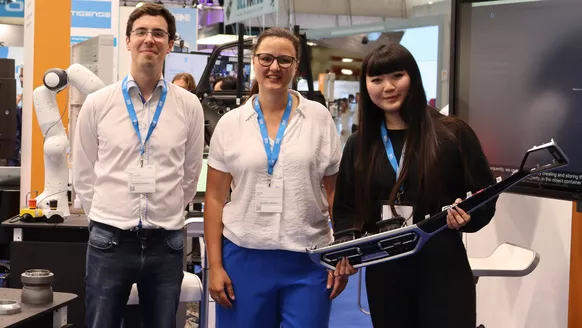In her master's thesis, which was awarded twice, Fandi Bi already examined technical debt in mechatronics systems. In simple terms, technical debt refers to lazy compromises that are usually made in the planning and development phase, leading to efficiency losses in the mid and long term.
Now, as part of her doctoral thesis at the Chair of Automation and Information Systems of Prof. Birgit Vogel-Heuser at the Technical University of Munich (TUM), she is working on further categorization, analysis, and prevention of technical debt.
Fandi, for your master's thesis you talked to 50 experts from 21 companies in the industry to find out whether collaboration between the disciplines of mechanics, electrical engineering, and software works well in the development and production of mechatronic products. What are your findings?
It was clear that lazy trade-offs were being made between these disciplines. However, it was still difficult to qualitatively and quantitatively assess the extent of the so-called technical debt. We soon realized that there had been no comparable studies in this area, nor was the phenomenon known to most companies. For my research, it was first necessary to talk to as many experts as possible to create a representative database for further investigation.
What exactly went wrong?
Too little attention has been paid to the other company’s other discipines- keyword: "silo thinking". Experts should clearly define the requirements and interfaces for all fields concerned. When a mechanical engineer makes a decision, the electrical and software engineer should be involved or informed right away. If this is not the case, changes often occur in the design phase, leading to incompatible interfaces and frequently remaining undetected until later stages. For example, if the sensor changes, its software must also be rewritten. Other sources of technical debt can be, for example, "spaghetti code" or a limited-extensible software architecture, which can be avoided, e.g., by refactoring, i.e., by restructuring the code. Otherwise, lazy compromises arise - and thus duplicate work. So if you keep the technical debt in mind from the beginning, you will already save time and money in the mid-term.
The VDI (Verein Deutscher Ingenieure) also recognized your work and awarded you a prize for the best master's thesis in your year. And the Wittenstein company also awarded you a faculty prize for it. Are you still involved with this topic nowadays?
Yes, the topic is now funded by the German Research Foundation (DFG) and is the core of my doctoral thesis. My aim now is to find out how these lazy compromises and their longer-term damage to the company can be automatically identified at an early stage so that projects and companies can be better managed using systematic approaches. Another important topic for me is the KI.Fabrik. In the lighthouse project of the Munich Institute of Robotics and Machine Intelligence (MIRMI), I am currently focusing on two topics at our chair: agent-based systems and digital twins. If, for example, drills, milling machines, or similar manufacturing stations are to execute a process without central control, smart systems must not only be able to "think" but should also be able to exchange information and negotiate with each other. To achieve this level of flexibility, agent systems are a very suitable technology. The so-called Asset Administration Shell (AAS) provides the basic data structure for intelligent communication. To enable intelligent control of the factory of tomorrow, we are bridging the gap between agents and AAS to the digital twin.
Further references:
Technical Debt
- Journal Paper from Fandi Bi’s Master’s thesis: Interdisciplinary effects of technical debt in companies with mechatronic products — a qualitative study. https://www.sciencedirect.com/science/article/pii/S0164121220302119
- Conference Paper of the follow-up study: Frequency and Impact of Technical Debt Characteristics in Companies Producing Mechatronic Products. https://ieeexplore.ieee.org/document/9463044 Open source document: https://arxiv.org/abs/2103.13350
Decentralized Systems/Scheduling/Digital Twin
- A Deep Reinforcement Learning based Approach for Dynamic Distributed Blocking Flowshop Scheduling with Job Insertions (accepted). Journal: IET Collaborative Intelligent Manufacturing
